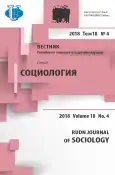ПОЗИЦИОНИРОВАНИЕ МЕЖДУНАРОДНОГО НАУЧНО-ТЕХНИЧЕСКОГО СОТРУДНИЧЕСТВА В ПРАВОВЫХ ДОКУМЕНТАХ СТРАН - УЧАСТНИКОВ НАУЧНОЙ ГЛОБАЛИЗАЦИИ
- Авторы: Балякин А.А.1, Задорина А.К.2, Куклина И.Р.2, Малышев А.С.1, Тараненко С.Б.1
-
Учреждения:
- Научно-исследовательский центр «Курчатовский институт»
- Аналитический центр международных научно-технологических и образовательных программ
- Выпуск: Том 18, № 4 (2018)
- Страницы: 651-667
- Раздел: Современное общество: актуальные проблемы и перспективы развития
- URL: https://journal-vniispk.ru/2313-2272/article/view/340455
- DOI: https://doi.org/10.22363/2313-2272-2018-18-4-651-667
- ID: 340455
Цитировать
Полный текст
Аннотация
Регламентация международного научно-технического сотрудничества в Российской Федерации в целях оптимизации принятия управленческих решений в сфере научной кооперации требует учета опыта других стран. В статье проанализированы стратегические документы в сфере международного научно-технического сотрудничества 19 стран и предложена их классификация по трем группам: первая группа - страны с наличием отдельного стратегического документа о международном научно-техническом сотрудничестве; вторая - страны с наличием документа о региональном научнотехническом сотрудничестве; третья - государства, политика которых в области международного научно-технического сотрудничества сформулирована в рамках национальных стратегий развития науки и технологий и интегрирована в планы действия/стратегии соответствующих ведомств. В статье описана организация международного научно-технического сотрудничества в США, Мексике и Швеции. Показано, что в США реализована распределенная система координации международной научной деятельности при наличии единого общегосударственного подхода - когда наука выступает инструментом реализации американской внешней политики. Для Мексики характерна выраженная региональная составляющая в международном научно-техническом сотрудничестве при отсутствии единого регулирующего документа. В Швеции международная научная кооперация рассматривается как часть внешней политики и подчинена Министерству иностранных дел. На основании изученных документов в статье сформулированы предложения для российской научно-технической политики, использованные в разработке проекта Концепции международного научно-технического сотрудничества Российской Федерации. Авторы предлагают активизировать участие России в мировом научном процессе, используя опыт стран-лидеров, таких как США и Швейцария: способствуя развитию научной дипломатии и мобильности ученых, отражая в научном сотрудничестве политические интересы России, в частности в отношении СНГ, БРИКС и ЕАЭС. В разрабатываемые программные документы должны войти вопросы финансирования совместных исследований и оценка эффективности сотрудничества (качественные и количественные показатели, отражающие успех научных коллабораций).
Об авторах
Артем Александрович Балякин
Научно-исследовательский центр «Курчатовский институт»
Автор, ответственный за переписку.
Email: Balyakin_AA@nrcki.ru
кандидат физико-математических наук, начальник управления Научно-исследовательского центра «Курчатовский институт»
пл. Академика Курчатова, 1, Москва, 123182, РоссияАнастасия Константиновна Задорина
Аналитический центр международных научно-технологических и образовательных программ
Email: zadorina@mniop.ru
заместитель исполнительного директора по международному научно-техническому сотрудничеству Аналитического центра Международных научно-технологических и образовательных программ
Ленинские горы, 1-75, Москва, 119992, РоссияИрина Рудольфовна Куклина
Аналитический центр международных научно-технологических и образовательных программ
Email: kuklina@mniop.ru
исполнительный директор Аналитического центра Международных научно-технологических и образовательных программ
Ленинские горы, 1-75, Москва, 119992, РоссияАндрей Сергеевич Малышев
Научно-исследовательский центр «Курчатовский институт»
Email: Malyshev_AS@nrcki.ru
кандидат технических наук, ведущий инженер Научно-исследовательского центра «Курчатовский институт»
пл. Академика Курчатова, 1, Москва, 123182, РоссияСергей Борисович Тараненко
Научно-исследовательский центр «Курчатовский институт»
Email: Taranenko_SB@nrcki.ru
начальник отдела Научно-исследовательского центра «Курчатовский институт»
пл. Академика Курчатова, 1, Москва, 123182, РоссияСписок литературы
- Actualización al. Manual de Organización del Consejo Nacional de Ciencia y Tecnología. http://www.conacyt.gob.mx/images/conacyt/normatividad/Manual_de_Organizacion_CONACYT_ septiembre_2017.pdf.
- Agreement for Scientific and Technological Cooperation between the European Community and the United Mexican States. https://eur-lex.europa.eu/legal-content/EN/TXT/PDF/?uri= CELEX:22005A1104(01)&from=EN.
- Arturo Borja Tamayo. Overview of German-Mexican cooperation in science, technology & innovation. Forum on Science, Technology and Innovation Mexico-Germany. November 14-15, 2016. http://www.conacyt.gob.mx/pci/index.php/bilateral-y-multilateral/gmstif/documentsand-downloads/overview-german-mexico-sti/387-kn0-conacyt/file.
- Busan partnership for effective development cooperation. Fourth High Level Forum on Aid Effectiveness. Busan, November 29 - December 1, 2011. https://www.oecd.org/development/ effectiveness/49650173.pdf.
- Estatuto Organica del Consejo Nacional de Ciencia y Technología. http://www.conacyt.gob.mx/ images/pdfs_conacyt/Estatuto_Organico_CONACYT_DOF_05.09.2017_integrado.pdf.
- Government Bill 2002/03:122. Shared Responsibility: Sweden’s Policy for Global Development. http://www.government.se/49b752/contentassets/8de3998852514bfca457152418faa322/sharedresponsibility-swedens-policy-for-global-development.
- Government Communication 2016/17:60. Policy Framework for Swedish Development Cooperation and Humanitarian Assistance. http://www.government.se/49a184/contentassets/ 43972c7f81c34d51a82e6a7502860895/skr-60-engelsk-version_web.pdf.
- National Policy on Science, Technology & Innovation (NPSTI) 2013-2020. http://mastic.mosti.gov.my/documents/10156/225696/NPSTI+2013-2020+ENGLISH+final.pdf.
- Información General de la Convocatoria CONACYT-Horizon2020. http://www.conacyt.gob.mx/ pci/index.php/dci/pe/programa-marco-de-investigacion-y-desarrollo-tecnologico-de-la-unioneuropea/horizon-2020/gi-callh2020esp.
- International Science and Engineering Partnerships: A Priority for U.S. Foreign Policy and Our Nation’s Innovation Enterprise. 14.02.2014. https://www.nsf.gov/nsb/publications/2008/nsb084.pdf.
- International Science and Technology Strategy for the United States Department of Defense. 2005. https://www.hsdl.org/?view&did=698413.
- Ley De Ciencia y Tecnología. http://www.diputados.gob.mx/LeyesBiblio/pdf/242_081215.pdf.
- National Launch of Impacting Research Innovation and Technology (IMPRINT). Ministry of Human Resource Development, Government of India, New Delhi, November 5, 2015. http://imprint-india.org/uploads/IMPRINT%20Brochure_Final.pdf.
- Plan Nacional de Desarollo 2007-2012. Escenarios, Programas e Indicadores. Centro de Estudios de las Finanzas Públicas. 2007. http://www.cefp.gob.mx/intr/edocumentos/pdf/ cefp/cefp0962007.pdf.
- Plan Nacional de Desarrollo 2013-2018 de México. https://observatorioplanificacion.cepal.org/ sites/default/files/plan/files/MexicoPlanNacionaldeDesarrollo20132018.pdf.
- Principles for Promoting Access to Federal Government-Supported Scientific Data and Research Findings Through International Scientific Cooperation. Interagency Working Group on Open Data Sharing Policy of the Subcommittee on International Issues of the Committee on Science of the National Science and Technology Council. 2016. https://obamawhitehouse.archives.gov/ sites/default/files/microsites/ostp/NSTC/iwgodsp_principles_0.pdf.
- Programa Especial de Ciencia, Tecnología e Innovación 2014-2018. http://www.dof.gob.mx/ nota_detalle.php?codigo=5354626&fecha=30/07/2014.
- Programa Institucional Conacyt 2014-2018. Consejo Nacional de Ciencia y Tecnología (CONACYT).http://www.conacyt.gob.mx/images/conacyt/normatividad/interna/PROGRAMA_ INSTITUCIONAL_CONACYT_2014-2018.pdf.
- Strategy for Research Cooperation and Research in Development Cooperation 2015-2021. Government Offices of Sweden. http://www.regeringen.se/49f23e/contentassets/35640f803c 554f5abe17800242c5bcb3/strategi-for-forskningssamarbete-pdf-for-webb-eng-2.pdf.
- Switzerland’s International Strategy for Education, Research and Innovation approved by the Federal Council on June 30, 2010. https://www.sbfi.admin.ch/dam/sbfi/en/dokumente/ internationale_strategiederschweizimbereichbildungforschungundin.pdf.download.pdf/ switzerland_s_internationalstrategyforeducationresearchandinnova.pdf.
- The Accra Agenda for Action (AAA). 2008. https://www.oecd.org/dac/effectiveness/45827311.pdf
- The President’s Office of Science and Technology Policy (OSTP): Issues for Congress. 13.01.2014. https://fas.org/sgp/crs/misc/RL34736.pdf
- Tinja Zerzer. Transnational Lecture Series on the Internationalization of Science, Technology and Innovation. 20.06.2017. http://www.oiip.ac.at/fileadmin/Unterlagen/Dateien/Summaries/ Summary_Lecture_Mexiko.pdf.
- Yongxiang Lu. Science and Technology in China: A Roadmap to 2050: Strategic General Report of the Chinese Academy of Sciences. http://library.aceondo.net/ebooks/HISTORY/ Science_&_Technology_in_China__A_Roadmap_to_2050__Strategic_General_Report_ of_the_20121130215622420.pdf.
- Парижская Декларация по повышению эффективности внешней помощи. Приверженность, гармонизация, согласование, результаты и взаимная подотчетность / Parizhskaya Deklaratsiya po povysheniyu effektivnosti vneshney pomoschi. Priverzhennost, garmonizatsiya, soglasovaniye, rezultaty i vzaimnaya podotchetnost [Paris Declaration on Aid Effectiveness. Ownership, Harmonization, Alignment, Results and Mutual Accountability]. 2005. https://www.oecd.org/dac/effectiveness/35023545.pdf (In Russ.)
Дополнительные файлы









